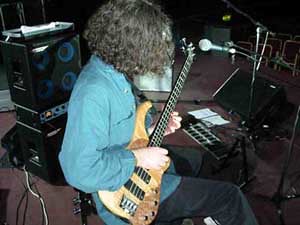 How did what you were advised to do at school connect with what you ended up doing?
How did what you were advised to do at school connect with what you ended up doing?
I don’t know about you, but our careers advisory service back then was woeful to the point of being hilarious. There was a tick-box questionnaire that then made recommendations for what kind of jobs you should do. If you ticked yes to ‘do you like being outside?’, you invariably had ‘forestry commission’ suggested as a potential job on the dot matrix print-out you received.
As someone who was obsessed with music by the time we got that far, all my answers related to the fact that I wanted to be a musician. I was rapidly failing Biology at A Level, had already dropped Classics by then (did the first year, went into my mock exam slightly drunk thanks to using home-brew beer as a memory aide, failed it and quit) and was doing rather well as AS Level Music (ended up failing, after getting one of the highest marks the school had ever had for composition… failed the history paper for the same reason I failed Classics… not smart).
But there was no advice for musicians, other than ‘our survey says you could be a musician. Maybe join the army, they have musicians’.
It was rubbish – the reliance on wholly inadequate technology was a cop-out, and there was no sense that careers advice was meant to inspire us to do anything GOOD in the world. This was one year post-Thatcher, the yuppie years were on the downward slide, but careers advice was still geared towards getting a job in finance, engineering, industry… Anything outside that was just ‘does not compute’.
So what’s changed? Well for one thing, people can seek their own career’s advice. Back in ‘91, I could’ve gone to the library, but there was very little written about working in the creative sector, and how would I have found it?
Now, young people (or older people looking to change jobs) can get online and find endless resources about what they can do, why they should do it and how they can end up making a living at it.
In short, no-one talked to me at 17 about the difference between a job and a vocation, about the validity of turning passions into careers, about the reality of diversifying, about the REAL relationship between university education and employment.
I’m not sure how much better it is in schools these days, but one website that is telling a whole range of amazing stories is iCould.com – a collection of video stories will real people in real jobs, many with completely non-standard ways of getting where they got to. Doing it cos they love it.
The UK Government are using iCould to find out what people think about careers advice. This video from Alan Milburn sets the scene:
And over on this page, there’s a chance for people to tell the government what they think of the careers advice they’re getting…
The majority of the most interesting people I know have ‘non-standard’ careers. Most of them are doing what they feel compelled to do, and have somehow turned it into something that’ll pay the bills so they can do more of it. Sites like iCould.com give voice to those non-standard paths that until now have never appeared in careers advisory presentations and computer print-outs, and yet are ultimately what makes life interesting.
I’m helping iCould.com out with some social media strategy stuff, getting the word out about it. It’s an exciting initiative, and I wonder how many people my age would be living very different lives if they’d had access to real life inspiring career tales before making their job decisions.
So, two things:
- Please ask people you know between the ages of 16-25(ish) to go and fill out the questionnaire – the more people do, the more impetus there is for a change.
- Have a browse around iCould.com – there are some fab stories in there, especially when you contrast them – these two from photographers were faves of me – this one in fashion, and this one a medical photographer. Two very different approaches to the same career, and neither with a standardised path into it…
In the comments:
- what were you advised to do at school?
- Were they right?
- Did you have any really cool teachers who told you to ignore the print-outs and go with your passions?
- How did you end up doing what you’re doing?
Feel free to write your own blog post, and link back to here so it appears in the trackbacks… I’ll follow this post up with some thoughts on careers in music and creative sector.
